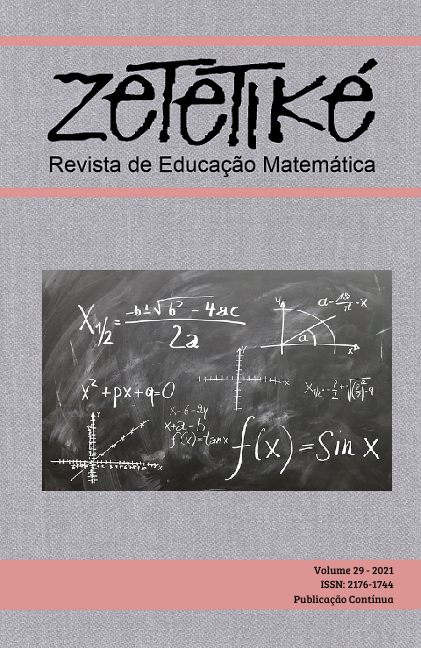Abstract
Recurring in academic scientific discussions and, consequently, in investigations in the area of Mathematics Education, the study of non-Euclidean geometries in the initial formation of the mathematics teacher can increase the undergraduate students' understanding of Euclidean geometric concepts. In the present article, the results of a Teaching Activity applied to future mathematics teachers presented, with the aim of analyzing the production of meanings of the participants in the study of non-Euclidean geometric concepts. Vygotsky's Historical-Cultural Theory, complemented by Leontiev's Activity Theory and Moura's Teaching Guidance Activity, are the theoretical contributions that supported the investigation and pedagogical actions in this study. By accepting the existence of other geometric models, the undergraduate students investigated changed the way they relate to the space in which they live and, thus, develop greater autonomy in the process of constructing the concepts by assigning different meanings to the studied geometric objects.
References
Abreu, G. (2000). O papel mediador da cultura na aprendizagem da matemática: a perspectiva de Vygotsky. Educação, Sociedade & Culturas, (13), 105-117.
Asbahr, F. S. F. (2014). Sentido pessoal, significado social e atividade de estudo: uma revisão teórica. Revista Quadrimestral da Associação Brasileira de Psicologia Escolar e Educacional, 18(2), 265-272. DOI: https://doi.org/10.1590/2175-3539/2014/0182744
Braida, F. C. (2012). Interferência do enquadramento de trabalho nas representações sobre o ensino de leitura no contexto da formação inicial docente sob o entendimento da Teoria Holística da Atividade. Tese de Doutorado em Letras - Estudos Linguísticos. Santa Maria, RS: Universidade Federal de Santa Maria.
Cardoso, N. P., Hundertmarck, J., Perlin, P., & Lopes, A. R. L. V. (2012). Atividade Orientadora de Ensino: uma experiência utilizando trocas nos anos iniciais. In Anais da 3a Escola de Inverno de Educação Matemática (pp. 1-11). Santa Maria, RS: 1o Encontro Nacional PIBID-MATEMÁTICA. Recuperado de https://www.ufsm.br/app/uploads/sites/534/2020/03/RE_Cardoso_Naise.pdf
Castorina, J. A. (1996). O debate Piaget-Vigotsky: a busca de um critério para uma avaliação. In J. A. Castorina, E. Ferreiro, D. Lerner & M. K. Oliveira. Piaget – Vigotsky: novas contribuições para o debate (pp. 7-50). São Paulo: Ática.
Duarte, N. (2004). Formação do indivíduo, consciência e alienação: o ser humano na psicologia de A. N. Leontiev. Caderno CEDES, 24(62), 44-63. Disponível em: http://www.scielo.br/ pdf/ccedes/v24n62/20091.pdf
Leontiev, A. N. (1978). O desenvolvimento do psiquismo (2a ed.). São Paulo: Centauro.
Lopes, A. R. L. V. (2009). Aprendizagem da docência em matemática: o Clube de Matemática como espaço de formação inicial de professores. Passo Fundo: Ed. Universidade de Passo Fundo.
Moura, M. O., Araújo, E. S., Ribeiro, F. D., Panossian, M. L., & Moretti, V. D. (2010). A atividade orientadora de ensino como unidade entre o ensino e a aprendizagem. In M. O. Moura (Org.), A atividade pedagógica na teoria histórico-cultural (pp. 81-109). Brasília, DF: Liber Livro.
Moura, M. O. (1996). Controle da variação de quantidades: atividades de ensino. São Paulo: FEUSP.
Moura, M. O. (2001). A atividade de ensino como ação formadora. In A. D. Castro & A. M. P. Carvalho (Orgs.), Ensinar a ensinar: didática para a escola fundamental e média (143-162). São Paulo: Thomson Learning.
Moysés, L. (1997). Aplicações de Vygotsky à educação matemática. Campinas: Papirus.
Vygotsky, L. S. (1987). Pensamento e linguagem. São Paulo: Martins Fontes.
Vygotsky, L. S. (1993). Pensamiento y palabra. In L. S. Vygotsky, Obras escogidas (vol. 2) (pp. 287-348). Madrid: Visor.
Vygotsky, L. S. (2003). A formação social da mente: desenvolvimento da percepção e da atenção (6a ed.). São Paulo: Martins Fontes.
Vygotsky, L. S., Luria, A. R., & Leontiev, A. N. (2010). Linguagem, desenvolvimento e aprendizagem (11a ed.). São Paulo: Ícone.

This work is licensed under a Creative Commons Attribution-NonCommercial-NoDerivatives 4.0 International License.
Copyright (c) 2021 Zetetiké


